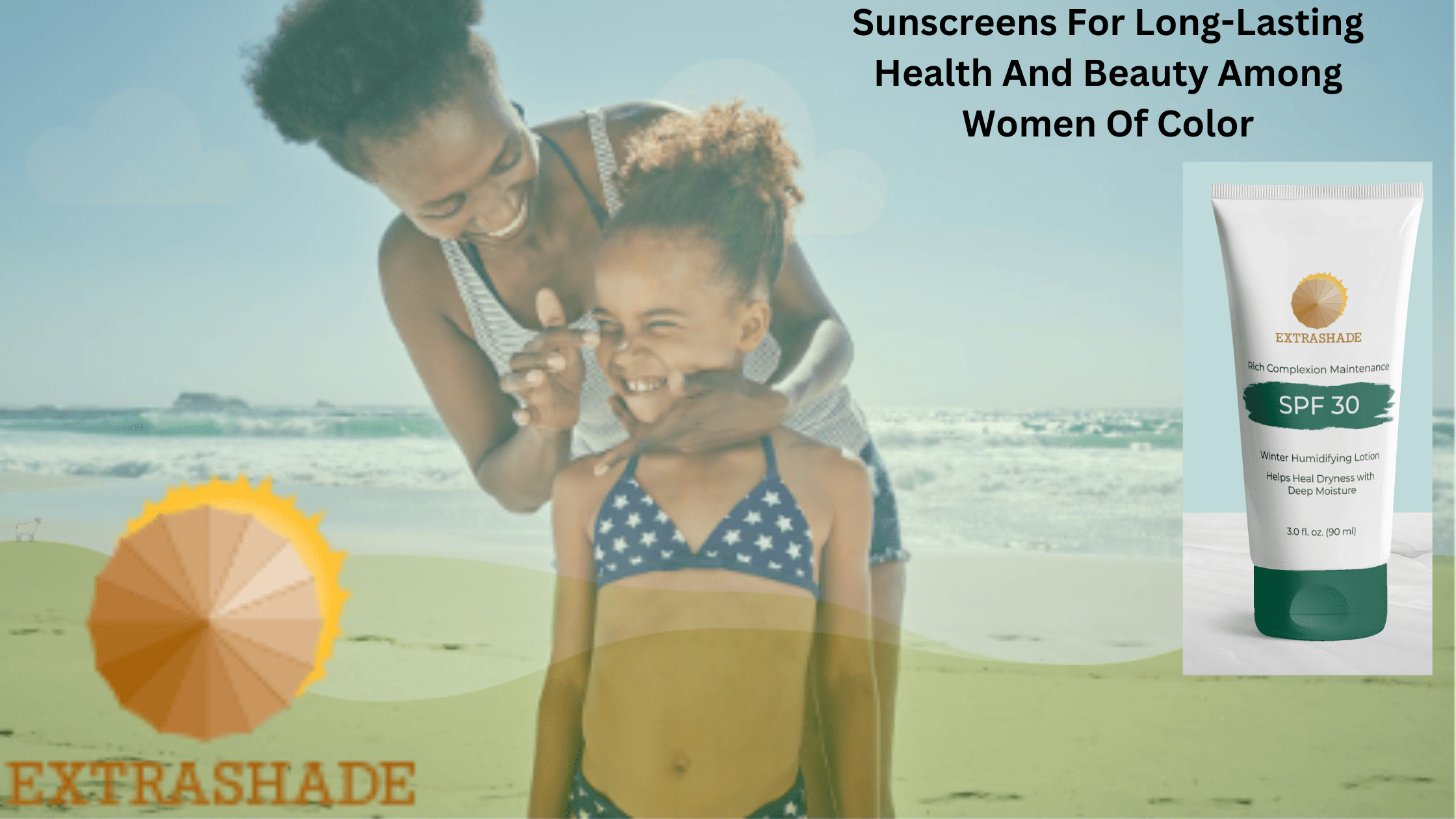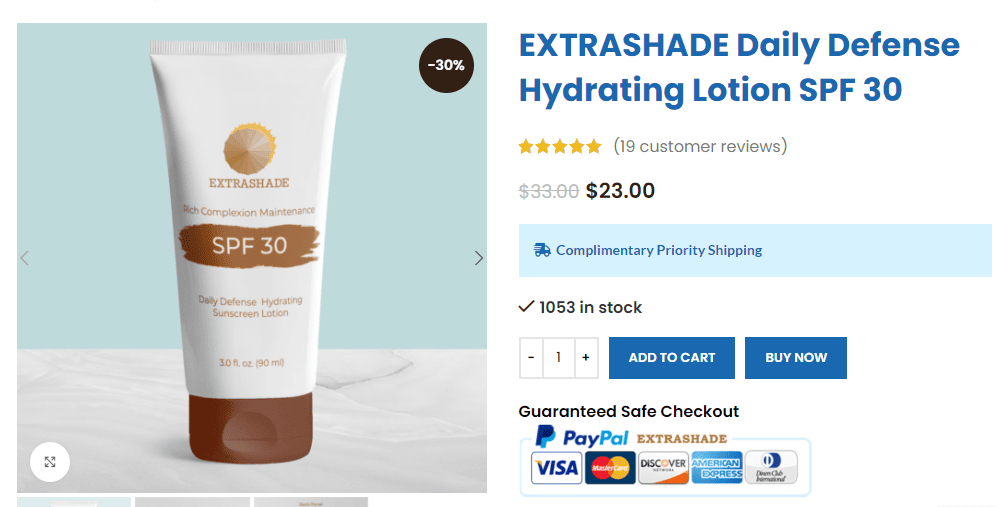For centuries, we’ve embraced the beauty of our sun-kissed complexions, knowing that melanin is our inherent armor against the sun’s harsh rays. But even the most powerful shield deserves a little extra shine, and that’s where sun protection comes in. ✨
Forget chalky creams and ghostly residue! Sunscreens for women of color have come a long way. Today, it’s about celebrating our unique melanin tones while safeguarding our skin’s health and, yes, amplifying that natural radiance.
So, whether you’re a sun-drenched goddess or a city-slick siren, get ready to dive into the vibrant world of sunscreens made for us, by us.
Understanding Different Skin Tones: Variations in melanin levels
The beautiful tapestry of human skin tones is a fascinating story written in melanin. This pigment, produced by cells called melanocytes, plays a starring role in determining our skin, hair, and even eye color.
1. Melanin’s Shades
There are two main types of melanin:
- Eumelanin: Responsible for brown and black tones, it acts like a natural sunscreen, absorbing harmful UV rays from the sun.
- Pheomelanin: Creates shades of yellow, red, and orange.
The intricate interplay of these types and their amount, along with other factors like the size and distribution of melanin granules, contributes to the vast spectrum of skin tones we see across the globe.
2. Melanin and Geography
Interestingly, there’s a strong link between melanin levels and geographic location. Populations closer to the equator, exposed to intense sunlight, tend to have higher melanin production for protection, resulting in darker skin. Conversely, those in less sun-drenched regions have lighter skin tones. This adaptation, shaped by natural selection over millennia, reflects the crucial role melanin plays in safeguarding our health.
3. Beyond Melanin
While melanin holds the starring role, other factors influence skin tone:
- Carotenoids: These orange-pigmented antioxidants, found in fruits and vegetables, contribute to a warm, ruddy complexion.
- Blood vessels: The underlying vasculature can peek through, especially in fair skin, adding pink or red hues.
- Collagen and elastin: These proteins influence skin texture and light scattering, impacting overall tone.
4. Celebrating Diversity
Understanding the science behind skin tone variations is crucial in appreciating the incredible diversity of our species. Recognizing the evolutionary and functional significance of melanin helps combat harmful stereotypes and discrimination based on color. Our differences are not just superficial; they are stories etched in our skin, telling tales of adaptation, resilience, and the beauty of human evolution.
Sunscreen Ingredients to Look For: Zinc, titanium dioxide, avobenzone
You’ve got it right! When choosing sunscreen, looking for these ingredients is a great start:
Zinc oxide and titanium dioxide: These mineral ingredients are physical sunscreens, meaning they sit on top of the skin like a shield, reflecting UV rays away. They offer broad-spectrum protection against both UVA and UVB rays, are generally safe for sensitive skin, and are the only two ingredients currently labeled as “generally recognized as safe and effective” by the FDA.
Avobenzone: This chemical sunscreen absorbs UV rays and converts them into heat, which is then released from the skin. It provides broad-spectrum protection and is often paired with zinc oxide or titanium dioxide for a more complete shield. However, avobenzone can be less stable and break down in sunlight, requiring reapplication more frequently.
Here are some additional things to consider when choosing a sunscreen.
- Broad-spectrum protection: Look for a sunscreen labeled “broad-spectrum” or “UVA/UVB protection.” This ensures it protects against both types of UV rays, which contribute to sunburn and skin cancer.
- SPF rating: Choose an SPF of 30 or higher for everyday use. Higher SPFs offer more protection but can also be thicker and less cosmetically elegant.
- Water resistance: Choose a water-resistant sunscreen if you’ll be sweating or swimming. Look for labels that say “water resistant” for 40 or 80 minutes.
- Skin type: Consider your skin type when choosing a sunscreen. For example, if you have sensitive skin, look for sunscreen that is fragrance- and oil-free.
By incorporating these tips and keeping an eye out for zinc, titanium dioxide, and avobenzone (with responsible reapplication if using avobenzone), you can be well on your way to keeping your skin protected from the sun’s harmful rays.
The Impact of UV Radiation on Darker Skin: Misconceptions and Risks
There are several misconceptions surrounding the impact of UV (ultraviolet) radiation on darker skin tones. It’s important to address these misconceptions and understand the risks associated with UV exposure for individuals with darker skin.
- Misconception: Darker skin is not susceptible to sun damage
- Reality: While it’s true that darker skin has more melanin, which provides some natural protection against UV radiation, it does not make individuals immune to sun damage. Darker skin can still suffer from sunburn, premature aging, and an increased risk of skin cancer.
- Misconception: Dark skin doesn’t need sunscreen
- Reality: Sunscreen is essential for all skin types, regardless of color. While darker skin may have some built-in protection, it’s not sufficient to prevent all potential damage. Sunscreen helps protect against both UVA and UVB rays, reducing the risk of sunburn, skin aging, and skin cancer.
- Misconception: Darker skin doesn’t need as much sun protection as lighter skin.
- Reality: Everyone should take precautions to protect their skin from UV radiation, regardless of their skin tone. The amount of melanin in darker skin provides some natural protection, but it doesn’t eliminate the need for sun protection measures like wearing protective clothing, seeking shade, and using sunscreen.
- Misconception: Dark skin doesn’t get skin cancer.
- Reality: While individuals with darker skin have a lower overall risk of developing skin cancer compared to those with lighter skin, they are not immune. Skin cancer can occur on any skin type, and when it does appear on darker skin, it is often diagnosed at a later, more advanced stage, making early detection and prevention crucial.
- Misconception: Tanning is safe for dark skin.
- Reality: Tanning, whether from the sun or indoor tanning beds, increases the risk of skin damage and skin cancer, even in individuals with darker skin. The idea that a tan is a sign of health is a misconception; in reality, it is a sign of skin damage.
- Misconception: Dark skin doesn’t need regular skin checks.
- Reality: Regular skin checks are important for everyone, regardless of skin color. Skin cancer can develop in areas not commonly exposed to the sun, so it’s essential to check the entire body for any changes in moles, spots, or other skin abnormalities.
Best Sunscreens for Women of Color: Recommendations and Reviews
Sunscreens for women of color, especially those with darker skin tones, need to be formulated differently than traditional sunscreens to avoid leaving a white cast or feeling heavy on the skin. Here are a few recommendations and reviews of EXTRASHADE sunscreens for women of color:
EXTRASHADE Daily Defense Hydrating Lotion SPF 30
This lightweight, oil-free sunscreen is a great option for everyday wear. It’s fragrance-free and non-comedogenic, so it won’t clog pores or irritate sensitive skin. It also contains hyaluronic acid, which helps keep skin hydrated.
Reviews:
- “This is the best sunscreen I’ve ever used! It goes on smoothly and doesn’t leave a white cast. My skin feels hydrated and protected all day long.” Jessica L.
- “I’m so glad I found this sunscreen! I have sensitive skin and most sunscreens make me break out, but this one doesn’t. It’s also very affordable.” Sarah K.
Conclusion
Prioritizing sunscreen is more than a cosmetic choice; it’s an essential act of self-care for women of color seeking long-lasting health and beauty. Consistent sun protection not only defends against immediate concerns like sunburn and uneven skin tone but also preserves the skin’s strength, radiance, and resilience over time.
By making sunscreen a daily habit, women of color can actively prevent hyperpigmentation, premature aging, and other sun-induced damage often overlooked in deeper skin tones. It’s a simple, powerful step toward maintaining luminous, even skin and safeguarding long-term wellness — because healthy, beautiful skin is timeless at every shade.


